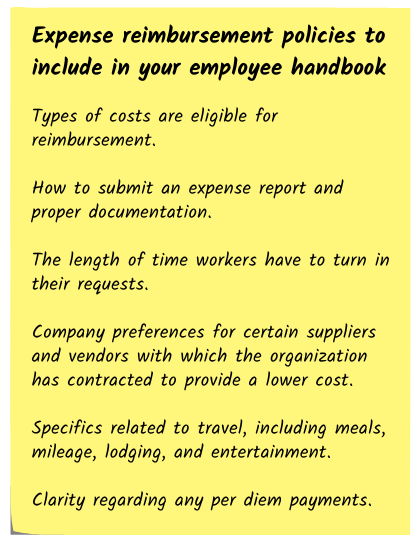5 things employees need to know about expense reimbursement
No employee wants to pocket the bill for work-related expenses that fall under the employer’s responsibility. Likewise, a worker getting reimbursed by his company for such costs should not have to pay income tax on that money as if it were earned income. However, handling employee expense reimbursement claims cannot be done willy-nilly.
Companies must keep track of everything in detail for both their own accounting purposes and to comply with IRS rules. Failure to do so could cause bookkeeping headaches, raise suspicions about honesty, and land the organization in hot water with the government during an audit.
It’s important to convey to your employees early and often the seriousness of expense reimbursement and the importance of adhering to procedures. The following 5 items are some of the most important topics that employees should pay close attention to.
Reimbursement claims must have a business connection
Yes, this concept sounds obvious — however, some employees may have difficulty grasping the difference. Running to Starbucks to pick up three pounds of coffee for the office machine is likely a business expense. However, stopping in to grab a Frappuccino to drink on the bus commute home may not be. What if they’re traveling, however, then is a Frappuccino a justifiable expense?
Spell out that expenses incurred must relate to service to the employer. Have anyone having trouble determining the difference for an expense talk to his manager or an accounts payable representative.
Documentation is required when employees file for expense reimbursement
Employees should never think that their memory or estimate is “good enough” for the company to issue an expense reimbursement. Make it abundantly clear that all requests need substantiation in the form of a standardized form and supporting document (receipt or detailed bill). It should include the date, place of purchase, amount paid, and purpose of the expense. An employee who has lost a receipt or for some other reason cannot provide the proper paperwork needs to consult management for instruction regarding what to do.
Also, let people know company policy on submitting an original receipt vs. a scanned copy. Many organizations want the hard copy original attached to the expense report. Photocopies may come out blurry and also could raise questions about manipulation. There are similar concerns that one could modify or manufacture digitized receipts. Companies that do accept scans generally require the employee to retain the original in case it is ever needed.
Petty cash is not a free-for-all
Many companies keep a small amount of cash (oftentimes between $50-200) on hand for a designated person to give out for minor purchases. Define for your employees what counts as a petty cash expense and what requires formal submission through customary paperwork. Uninformed staff members may wrongly view petty cash simply as an alternative when they don’t feel like going through the regular process and waiting for a check. Some may even try to submit a purchase that would wipe out all the petty cash on hand in one shot!
Employees asking for petty cash should provide a purchase receipt to the petty cash cashier when seeking expense reimbursement. This action helps to keep the payout system honest and justifies the cashier’s request when seeking company money to replenish the petty cash fund.
Items used both personally and professionally need close attention

Organizations need to provide guidance on how to handle company expenses incurred from home. This is especially true during this time period where the COVID-19 pandemic has required many workers to operate remotely. As mentioned previously, reimbursement claims must be connected to the business in order to remain tax-free. Thus, ink and paper used to print out departmental reports is reimbursable, but ink and paper used to print out recipes for one’s cookbook is not. Employer-reimbursed home Internet access is tax-free under the accountable plan rules — but only the percentage of the bill that pertains to business use.
As this information is new territory to many employees and often confusing, consider creating a FAQ. Make employees aware of this list of common questions.
Prompt, accurate expense reimbursement relies on employee knowledge of policy
Obviously, employees want to get their money back quickly and in full. Point out that it is in their best interest to follow guidelines set forth by the company and ask any questions before costs get incurred. Better to understand the maximum reimbursement allowed in different categories, for instance, than to find out later that you exceeded the limit.
Many companies include their expense reimbursement policy in the employee handbook. Putting this information there ensures everyone has access to it to serve as a point of reference. Some of the areas worth covering include:
- Types of costs are eligible for reimbursement.
- How to submit an expense report and proper documentation.
- The length of time workers have to turn in their requests.
- Company preferences for certain suppliers and vendors with which the organization has contracted to provide a lower cost.
- Specifics related to travel, including meals, mileage, lodging, and entertainment.
- Clarity regarding any per diem payments.
Lastly, drive home the point that workers who falsify information will be subject to disciplinary measures. No employee should be looking at expense reimbursement as a money-making venture.
Additional Resource: See 8 common expense reimbursement mistakes to watch out for.




